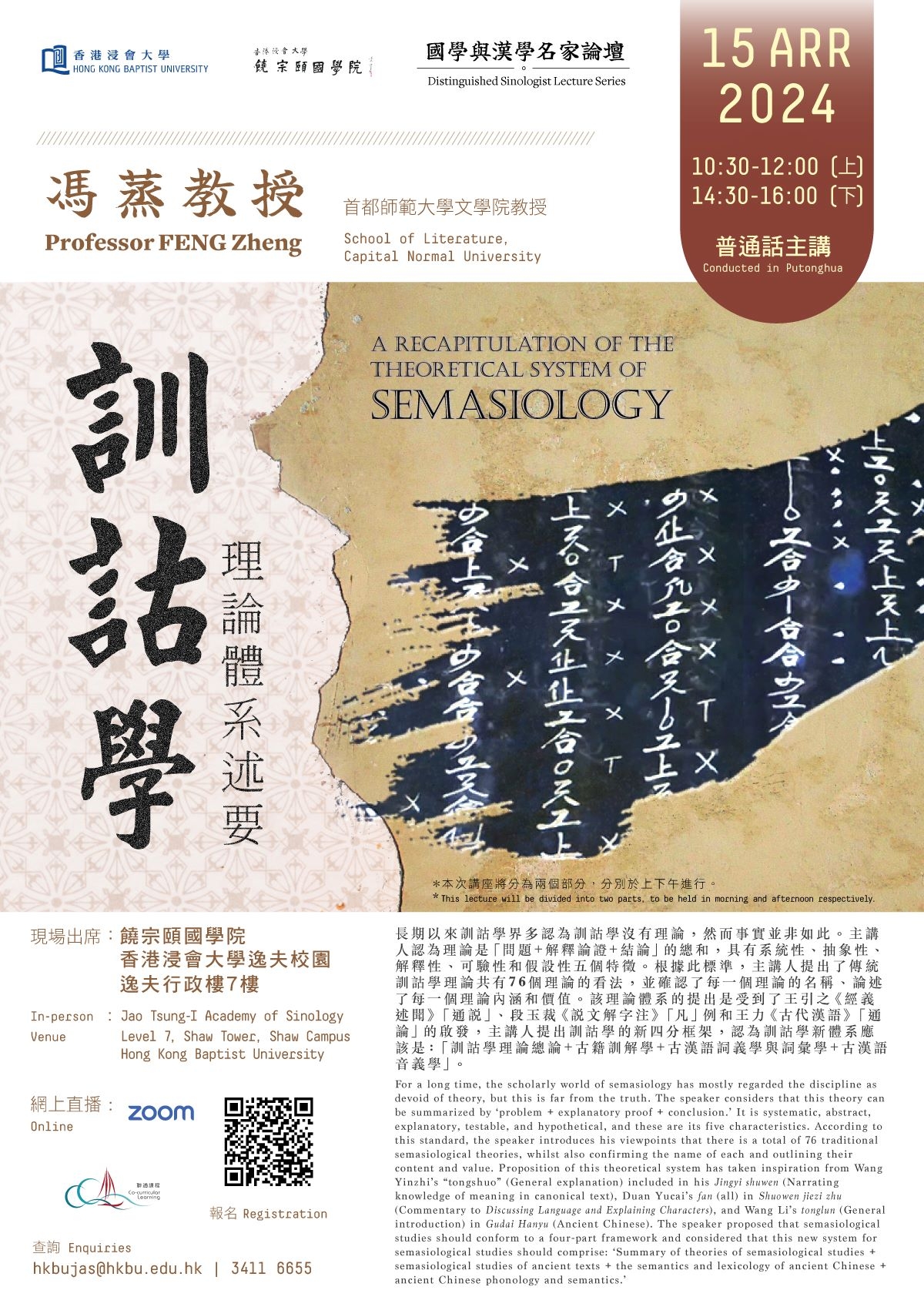Past Events
2024 Distinguished Sinologist Lecture Series: Professor FENG Zheng




The Academy is honoured to invite Professor FENG Zheng, School of Literature of Capital Normal University, to speak for 2024 Distinguished Sinologist Lecture Series with below details:
A Recapitulation of the Theoretical System of Semasiology
15 April 2024
10:30–12:00 Part I
14:30–16:00 Part II
*This lecture will be divided into two parts, to be held in morning and afternoon respectively.
Speaker: Professor FENG Zheng
Feng Zheng is a Professor at the School of Literature of Capital Normal University and acts as a supervisor of doctoral students. He is a key member and officer of the National Education Committee of Chinese Philology and a council member of the Chinese Phonological Research Society and the Beijing International Research Society into the Culture of Chinese Characters. In his early years, he was educated for many years by the two celebrated phonologists Lu Zhiwei and Wang Jingru, and in January 1978, started work at the Institute of Linguistics of the Chinese Academy of Social Sciences, where he also received guidance from the distinguished scholars Li Rong, Shao Rongfen, and Professor Wang Xian.
His research specialisms include phonology, historical linguistics, comparisons of Chinese-Tibetan languages, and dialect studies (especially Beijing patois). In the field of phonology, he has made important contributions to research into archaic Chinese, middle Chinese, and early modern Chinese phonology: in respect of archaic Chinese phonology, he has synthesized comparative research of archaic Chinese and the Chinese-Tibetan linguistic system to formulate his own individual research style; with middle Chinese, his research into the phonetic system of Qieyun (Cut rhymes) and the phonological exegesis of Erya yintu (Phonetic diagrams of the Erya dictionary) is the leading work in the field inside China; with early modern Chinese phonology, investigation of phonology of rhyme tables and Menggu ziyun (Rhyme dictionary in Mongolian script) as well as other rhyme dictionaries of the Ming and Qing dynasties has yielded fruitful discoveries. In addition, he has also touched on philology and researched deeply into Shuowen jiezi (Discussing language and explaining characters), and his monographs in this field have been extremely influential, both in China and overseas.
Language: Putonghua
In-person Venue: Jao Tsung-I Academy of Sinology, Level 7, Shaw Tower, Shaw Campus, Hong Kong Baptist University
Registration: https://forms.office.com/r/waAf9eiEvK
Online: Zoom: https://hkbu.zoom.us/j/91432126649?pwd=ZTF0L0hsNEIyMjhMNWFnWGM0bGU5UT09
Meeting ID: 914 3212 6649
Password: 878288
Abstract: For a long time, the scholarly world of semasiology has mostly regarded the discipline as devoid of theory, but this is far from the truth. The speaker considers that this theory can be summarized by ‘problem + explanatory proof + conclusion.’ It is systematic, abstract, explanatory, testable, and hypothetical, and these are its five characteristics. According to this standard, the speaker introduces his viewpoints that there is a total of 76 traditional semasiological theories, whilst also confirming the name of each and outlining their content and value. Proposition of this theoretical system has taken inspiration from Wang Yinzhi’s “tongshuo” (General explanation) included in his Jingyi shuwen (Narrating knowledge of meaning in canonical text), Duan Yucai’s fan (all) in Shuowen jiezi zhu (Commentary to Discussing Language and Explaining Characters), and Wang Li’s tonglun (General introduction) in Gudai Hanyu (Ancient Chinese). The speaker proposed that semasiological studies should conform to a four-part framework and considered that this new system for semasiological studies should comprise: ‘Summary of theories of semasiological studies + semasiological studies of ancient texts + the semantics and lexicology of ancient Chinese + ancient Chinese phonology and semantics.’ In this lecture, the speaker took the four-part framework as a premise and outlined the content and value of the 76 traditional theories of semasiological studies.
HKBU students: For CCL attendance, please (1) log in Zoom using HKBU email account, with your name as "STUDENT ID NO. + NAME", and (2) complete and submit the Co‐curricular Learning Evaluation Form after the activity in 3 working days.
Note: A CCL-recognised event must be at least 1.5 hours long. Please observe the requirements if students wish to update the attendance record.